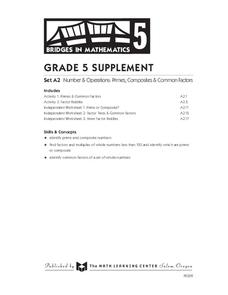Noyce Foundation
Double Down
Double the dog ears, double the fun. Five problems provide increasing challenges with non-linear growth. Topics include dog ears, family trees and population data, and geometric patterns.
Math Learning Center
Grade 5 Supplement Set A2 – Number and Operations: Primes, Composites and Common Factors
Incorporate riddles into your math lesson by having students make tree factors and determine if the number is a prime or composite. They will also use other clues to find the answer to the riddle while sharpening their...
Centre for Innovation in Mathematics Teaching
Ten Data Analysis Activities
This thirteen page data analysis learning exercise contains a number of interesting problems regarding statistics. The activities cover the concepts of average measurements, standard deviation, box and whisker plots, quartiles, frequency...
101 Questions
Lost in the City with a Clinometer
Come look at trigonometry from a different angle. To begin a simple activity, scholars view a video of someone using a clinometer to find the angle of elevation to the top of a building. They then use a diagram that shows the building's...
NASA
The Effects of Sunspots on Climate
In this sunspots and climate change learning exercise, learners use a diagram of a tree stump and its rings to determine the age of the tree. They use sunspot data from the internet and they construct an Excel spreadsheet to compare the...
US Apple Association
Apples: A Class Act! (Grades Pre-K–3)
Discover the nutritional wonders of apples and get to know Johnny Appleseed with a plethora of learning experiences that cover subjects math, history, English language arts, health, and arts and crafts. Activities include an apple...
Curated OER
Tetrahedral Dice
Put those thinking hats on and look at all the possible outcomes from rolling two different four-sided dice. The challenge in this problem is finding all the combinations when adding and subtracting the numbers from each die and creating...
National Council of Teachers of Mathematics
Is It Fair?
In this probability instructional activity, learners answer nine questions about the fairness of games. High schoolers determine if a game is fair or not. They list outcomes and find ones' chances of winning.
Oswego City School District
Regents Exam Prep Center: Tree Diagrams
This tutorial demonstrates how tree diagrams are constructed and shows how to calculate the probability of an event using a tree diagram. There are links to a lesson, practice page, and teacher resource pages with useful tips.
National Council of Teachers of Mathematics
The Math Forum: Drexel University: Boy or Girl?
Dr. Math explores the probability of the children in families being boys or girls. A look at the mathematics involved in each situation is included.
Annenberg Foundation
Annenberg Learner: Analyzing Binomial Probabilities
A tree diagram is a helpful tool for determining theoretical or mathematical probabilities. Toss a coin and watch as branches represent a toss of either head or tails.
University of Georgia
University of Georgia: Inter Math: Probability
This InterMath site gives a description of probability along with an example. Be sure to follow the links to related terms, everyday examples, challenging problems, more information, and the interactive check point involving probability...










